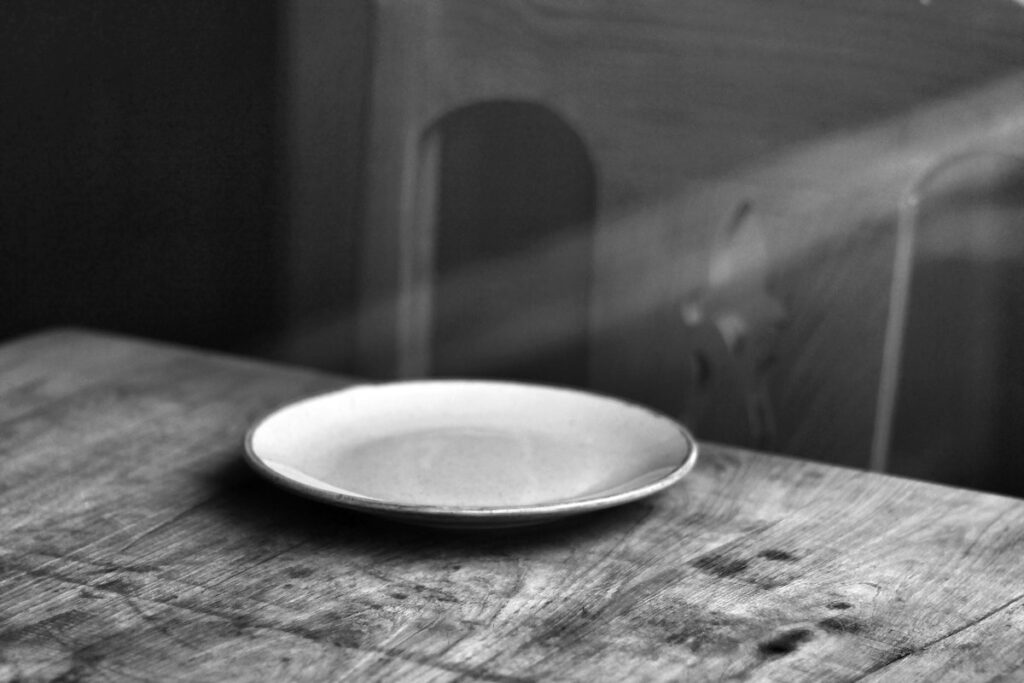In our near constant consumption of food, stories, and ideas, fasting has the appeal of a load of bricks. Denial of self lacks more than just appeal. It seems foreign and antiquated, a relic of bygone religions. Sure, fasting from food has reappeared as a dieting trend, along with other purges and fads designed to reset your body clock or get you back into that old pair of jeans. But fasting as a form of self-denial—to undermine yourself—seems out of place in our society today.

We understand sacrifice and discipline to some extent. We see athletes and artists who have honed their sport or their craft. We understand the time and energy poured out in private for the five minutes on the track. Less understandable is self-denial with the goal of becoming something less than what we were once before. How are you going to make progress on your self-project like that?
It’s even tempting for people who follow Jesus. After all, if we’re meant to love God and love others, shouldn’t we be fit for the task? To twist a prominent metaphor from the book of Hebrews, if we need to run the race set before us with endurance, then we’re going to need our wheaties.

Jesus provides a clear counterexample in the gospel stories. After receiving his Father’s blessing at His baptism, Jesus seemingly retreats to the desert, led away by the spirit to fast and pray. Shouldn’t He take advantage of the big moment? Won’t the followers just pile in to subscribe his new teachings? Instead, Jesus models for us the counterintuitive nature of God’s kingdom. There is more than what meets the eye, and to be strong spiritually, we must deny ourselves. We must spend time in the desert with our Father to be ready to resist the temptations of our day. The church in Antioch provides a similar model in Acts 13. As they gather to worship and fast, God prompts them to send out Paul and Barnabas for His work elsewhere. Curiously, we often have it backwards. We have an idea, and then we spend some time praying about it. In this story, the Holy Spirit is immediately identified as the source of this message.

So often our strategy comes across as little more than thinly veiled control, an attempt to plan and choreograph God’s kingdom on earth. This is a temptation I regularly face, perhaps born out of a gifting to see opportunity for the Good News to take root in places others may not notice. But having a good plan is not a good replacement for the Holy Spirit. Our Protestant work ethic cannot replace a faithful walk with God, where we listen to Him and respond accordingly. Fasting helps to pull the rug out from under our pride, especially the pride that may begin with good intentions and desires. By making ourselves weak, we acknowledge that it is only by God’s strength that we can serve Him and others.
Fasting also trains us for persecution. If we return to the athlete’s metaphor, we see that the best athletes rarely train during ideal circumstances. They regularly incorporate resistance into their training, sometimes with weights or adverse weather conditions. As Christians who are seeking Jesus and serving those around us, we need to practice denying ourselves for the moments of life when our neighbours or our community will reject us.
Rejection and the fear of it can be a sneaky adversary. For instance, last week I was passing out flyers for a Bible club for kids. I saw one attendee that hadn’t been to club in a while, and I waved and spoke with her briefly. She shared that she wouldn’t be coming back to club and offered no explanation why. My heart sank, after thinking of the time we had invested and the promising relationship we had fostered. For the rest of the afternoon, I brooded on that conversation and the rejection I personally felt—and this was just from a nine-year-old! The resistance or rejection we face isn’t always social or administrative. Sometimes it’s relational and emotional, and quite often it’s exacerbated by the unhealthy relationship we have with our own feelings. Regular fasting provides a rhythm of denying ourselves, and it helps prepare us for when others deny us, too.

Fasting helps us enter the suffering of others, like our brothers and sisters who face severe persecution for their faith in Jesus. We invite their pain to become our pain. We can do the same for the down and out at the edges of society to whom we minister. I’m reminded of how Jesus began the Sermon on the Mount in Matthew 5. Those of us who acknowledge our spiritual poverty are truly blessed, because only then are we ready to receive God’s generosity. If we struggle to feel compassionate for the downtrodden, fasting is a good discipline to join in their suffering, to empty ourselves and receive the same compassion that Jesus offered toward the crowds that followed him, “like sheep without a shepherd” (Mark 6:34).
Ironically, fasting also helps to build patience. Many people worry about the hangry factor, the irritableness that accompanies missing a meal. Others worry that they won’t be able to accomplish as much. However, this is the very goal of fasting, to acknowledge that you do not depend on how much you produce, but on how well you are connected with your Father. This shift in perspective doesn’t spring up overnight. It’s best cultivated like any other discipline: by beginning small and building endurance.
For those who have never fasted before and have health concerns, it’s best that you speak with your doctor first. This is especially important if you have a strained relationship with food, either by eating too little or too much. Fasting to deny yourself and be filled by God should not be an approach to weight loss.
